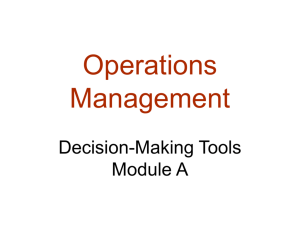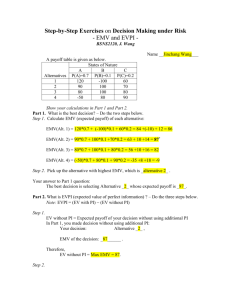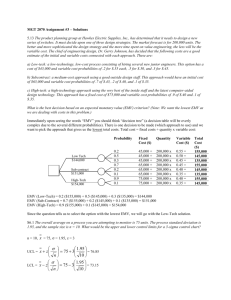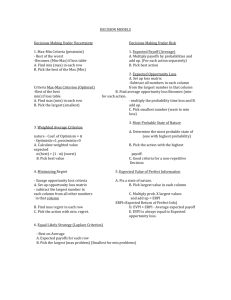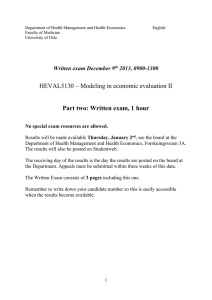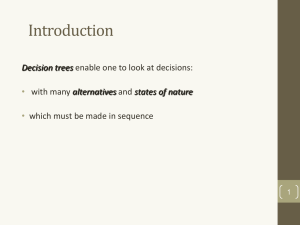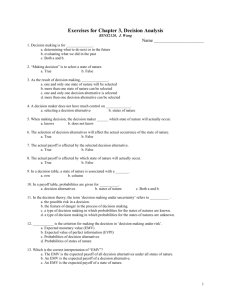Engineering Risk Benefit Analysis DA 2. The Value of Perfect Information
advertisement
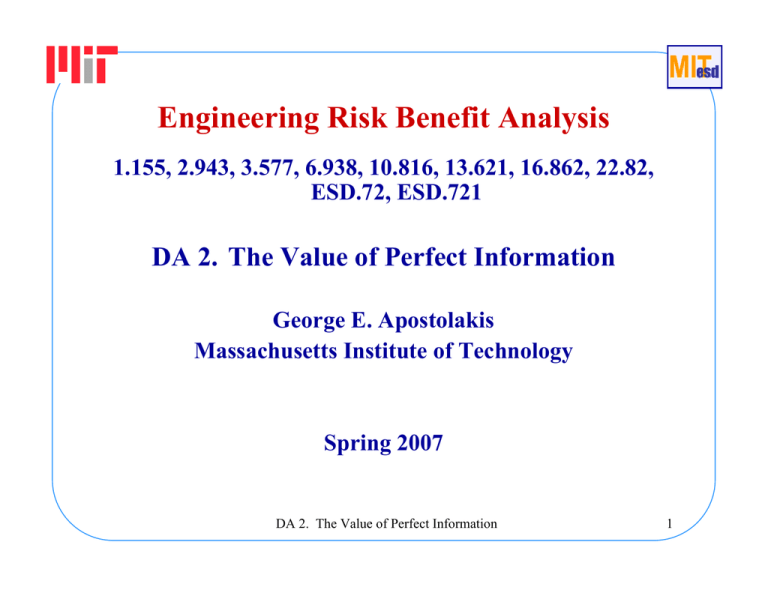
Engineering Risk Benefit Analysis 1.155, 2.943, 3.577, 6.938, 10.816, 13.621, 16.862, 22.82, ESD.72, ESD.721 DA 2. The Value of Perfect Information George E. Apostolakis Massachusetts Institute of Technology Spring 2007 DA 2. The Value of Perfect Information 1 Recall the evaluation of the survey results (Slide 14, DA 1): Strong P(s/L2) = 0.8 P(s/L3) = 0.2 P(s/L4) = 0.0 Mild P(m/L2) = 0.2 P(m/L3) = 0.6 P(m/L4) = 0.3 Weak P(w/L2) = 0.0 1.0 P(w/L3) = 0.2 1.0 P(w/L4) = 0.7 1.0 DA 2. The Value of Perfect Information 2 Perfect Information (Clairvoyant) • A clairvoyant, CV, is always correct, i.e., P[CV says L2 /L2 materializes] = 1.0 = P[s/L2] P[CV says L3 /L2 materializes] = 0.0 = P[m/L2] P[CV says L4 /L2 materializes] = 0.0 = P[w/L2] • Receiving the CV’s report removes all uncertainty. DA 2. The Value of Perfect Information 3 Calculations for “survey result is s” or “survey says L2” (Slide 18, DA 1) Payoff Prior Likelihood Prob. L2 L3 L4 0.3 0.5 0.2 1.0 P(s/ L2)=0.8 P(s/ L3)=0.2 P(s/ L4)=0.0 Product 0.24 0.10 0.00 0.34 Posterior Probability P(L2/s)=0.706 P(L3/s)=0.294 P(L4/s)=0.000 1.000 P[L2 materializes/survey says L2] = 0.706, because the survey is not perfect. DA 2. The Value of Perfect Information 4 Bayes’ Theorem for the Clairvoyant P[L2 materializes/ CV says L2] = = P(CVsaysL 2 / L 2materializes)xP(L 2materializes) 4 ∑ P(CVsaysL 2 / Limaterializes)xP(Limaterializes) 2 1xP(L 2materializes) = =1 1xP(L 2materializes) + 0 + 0 P[L2 materializes/ CV says L2] = 1 regardless of the prior probability, because the CV is perfect. DA 2. The Value of Perfect Information 5 = The original decision tree Decisions States of Nature Payoffs L2 $300K s, 0.3 m, 0.5 L3 $100K N w, 0.2 O 1.0 DA 2. The Value of Perfect Information L4 -$100K L1 $150K 6 Modifications In a decision tree, the order of the nodes is chronological. • With perfect information, the uncertainty is resolved before the decision is made (a chance node is followed by a decision node). • The evaluation is done a priori (before the CV is hired). • Therefore, the DM believes that the CV will predict L2 with probability 0.3, L3 with probability 0.5, and L4 with probability 0.2. DA 2. The Value of Perfect Information 7 Decision tree with a clairvoyant L2 $300K s, 0.3 m, 0.5 L3 $100K N β=$150K CV O w, 0.2 1.0 L4 -$100K L1 $150K α=$195K DA 2. The Value of Perfect Information 8 The value of alpha α: EMV, if the terminal decision is to be made with perfect information at no cost. α = 0.3x300 + 0.5x150 + 0.2x150 = $195K DA 2. The Value of Perfect Information 9 The value of beta • What is the EMV without any information? • We solved this problem in DA 1 (original decision tree). EMV[no information] = $150K ≡ β β: EMV, if the terminal decision is to be made without any opportunity to obtain additional information. Note:The chance node follows the decision node. DA 2. The Value of Perfect Information 10 Expected Value of Perfect Information (EVPI) EVPI ≡ α - β = $195 - $150 = $45K • The EVPI is an upper bound on the amount the DM would be willing to pay for additional information. • The expected value of any information source must be between zero and the EVPI. In DA 1, the cost of the survey was $20K < EVPI. DA 2. The Value of Perfect Information 11 Decision tree with a clairvoyant L2 $300K s, 0.3 m, 0.5 L3 $100K N β=$150K CV O w, 0.2 1.0 L4 -$100K L1 $150K α=$195K DA 2. The Value of Perfect Information 12 General Tree ♦ If the DM faces uncertainty in a decision (uncertainty nodes after the decision node), the impact of perfect information will be evaluated by redrawing the tree and reordering the decision and chance nodes. ♦ The evaluation of perfect information is done a priori. The DM has not yet consulted the clairvoyant. The DM is considering whether to actually do it. DA 2. The Value of Perfect Information 13 Summary and Observations • We have developed single-attribute, multi-stage sequential Decision Trees. • The model is useful to a single decision maker. • Decision Criterion: Maximize the EMV. • Maximizing the EMV is not the best decision criterion. DA 2. The Value of Perfect Information 14
